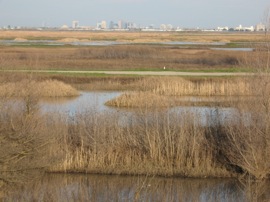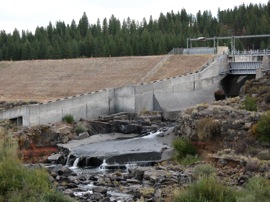Witnesses tell an Assembly committee that looming federal cuts would leave state programs adrift

An array of state programs to protect and restore rivers and wetlands is endangered by current plans to cut funding on Capitol Hill. That’s what a string of witnesses told the Assembly Water, Parks & Wildlife Committee in Sacramento this week.
At risk are programs that have leveraged federal money to restore hundreds of thousands of acres of wetlands and wildlife habitat in California, according to speakers for environmental and outdoor groups.
For a nearby example of how federal funds have been used, waterfowl advocate Bill Gaines pointed to the Yolo Bypass, almost within sight of the state Capitol. Gaines, president of the California Outdoor Heritage Alliance, said that over ten years, $5 million in federal money has fueled restoration of 4,300 acres of wildlife habitat.
Kim Delfino, who spoke for the activist group Defenders of Wildlife, told lawmakers that provisions in the federal budget bill known as HR-1 would gut funding for the state’s Land & Water Conservation Fund by 90%. Allocations have already dropped off precipitously in recent years to the program that funds improvements to local parks and beach access, among other things.

Also in jeopardy, according to testimony, are hard-won agreements to restore the San Joaquin and Klamath Rivers basins. The latter deal, which took 18 years to craft, requires the removal of four hydro-electric dams.
Gaines says wildlife refuge areas on the upper Klamath currently line up behind local farms for water allocations. “Without that money to remove those dams, the entire Klamath basin restoration agreement falls part and along with it, the water rights that the refuge complex up there so desperately needs,” said Gaines, whose organization represents a coalition of hunting, fishing and wildlife groups.
Zeke Grader, who represents commercial fishing interests, called the measure a “declaration of war” against the salmon fisheries and communities that rely on them.
Barry Nelson of the Natural Resources Defense Counsel testified that passage of HR-1 would “threaten the progress” that California is beginning to make on a host of water issues. Nelson said riders attached to the spending bill would deal a severe setback to current efforts to restore the San Joaquin River, and to secure the future health of the Sacramento-San Joaquin Delta.
2 thoughts on “Federal Budget Pressure on Rivers, Wetlands”
Comments are closed.

Returning the river system to a more natural state means less water attenuation, less water for farming, higher electricity costs and less area suitable for waterfowl. Personally I would like to see the proponents of these projects fund the money from their personal financial accounts instead of burdening the general population with their plans. That funding would of course include the initial costs as well as those recurring increased costs for electricity. I have a feeling their demands would disappear in short order. The power companies do not mind removing dams because they have agreements to increase electrical rates if they do. It is a simple case of sticking it to the working classes again by the elitists, if this gets funded.
I would counter that returning the river system to a more natural state means better habitat for salmon and other native aquatic species, less hospitable conditions for exotic, non-native species, better recreation conditions for outdoorsman and families, and improved water quality for all water users. The higher electricity costs simply reflect the end of public subsidies to farmers. We can certainly find somewhere less sensitive to grow those potatoes! And higher catches by salmon fisherman will restore healthier economies to coastal communities. Not to mention the benefits to the Yurok, Karuk and Klamath tribes, whose communities preceded all of us and which managed to not degrade the river during thousands of years of use. And finally, personally, I’m sick and tired of subsidizing wise-use windbags and rural tea-heads who moan about elitists shafting the working class while their very survival and maintenance of the basic services they use (health care, roads, fire protection, education) are predicated on tax redistribution from urban counties, only to arrive at the river and find it unsafe due to the toxic blue-green algae blooms promoted by over-fertilization of upstream agriculture and quiescent conditions in mammoth reservoirs.